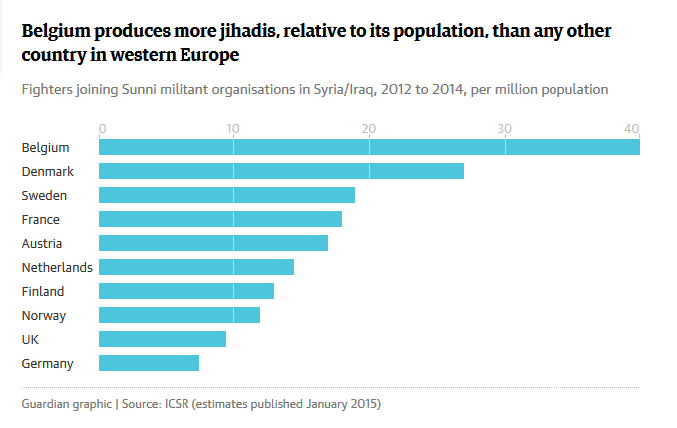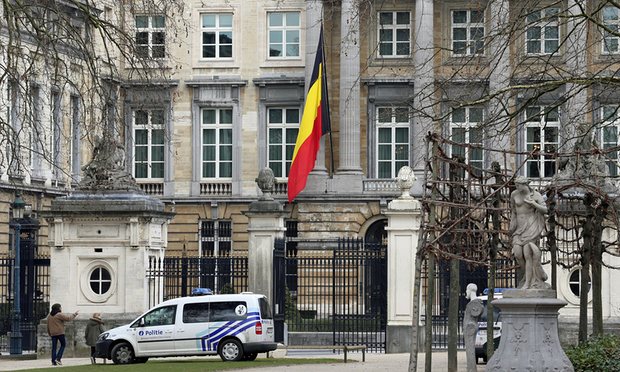Why Brussels? Belgium as the European epicentre of extremist violence
External Relations 11 April 2016Why Belgium? In the aftermath of the terrorists’ attack on the 22 of March in Brussels, it could be useful to go back to the origins…just a little bit, not so far in time, in order to understand what is going on nowadays in Europe.
Yes, exactly, in Europe. This article will not focus on the origins of the “international terror”, neither it will analyze the roots of the (too) imprecisely so-called “Islamic violence”. We want to recover the recent past of Belgium and its foreign policy, and by doing so we will give an answer to the previous question not trying to explain the reason why Belgium was attacked, but pointing out why many of the attackers came from Belgium itself.
Let’s go back to the history of European international relations and open the Belgium Chapter. In 1969, can be found the reason why Belgium became the European cradle of jihad. In that year, King Baudouin of Belgium gave the keys of the Grand Mosque in Park Cinquantenaire in Brussels – the oldest of the entire city, where was settled the Muslim Culture Centre in Belgium (CICB) – to Saudi King Faysal, who was in Belgium for an official visit.
At this point, we have to consider the nature of Saudi Arabia, a core partner for Europe and western countries. Saudi Arabia is a country commonly known as a rentier state whose economy is based on the production of a single good: oil. Revenues from oil were always used (and still are nowadays) as part of the King’s private possession. Saudi government gains important legitimacy from three main sources: as mentioned previously, the control over the single economic resource; in a second stance, the “family-factor” providing great cohesion within the government, given that most important authorities are linked by family ties; and third, the religious legitimacy. In fact, when in 1902 Abd al-Aziz Faisal Al Saud, from the ancient ruling family perched in Kuwait, reconquered Riyadh giving birth, in 1932, to a unified Saudi state (the Saudi Arabia Kingdom), the new state adopted Wahhabism – already rooted in the area since 1824 – as official doctrine.
This little gift by Baudouin to Faysal would have helped the spread of Wahhabism in Belgium: one of the most fundamentalist versions of Islam, widely diffused in Saudi Arabia also at present.
Let’s now explain something more about the international context. We have to remember that it happened in 1969, and King Baudouin took that decision due to the oil crisis rather than pure friendship – notwithstanding, the building of CICB became soon the most important place where Wahhabism could be broadcasted in Belgium. Today the mosque is just a symbol, having lost the fight against Youtube – a much more effective recruiter.
On the other hand, a building cannot be the only explanation for Paris attackers to have their own base in Molenbeek, neither it could explain the reason why Mehdi Nemmouche killed four people attacking the Jewish museum in Brussels; the Belgian origin of arms used by Coulibaly; the origin of the attacker of Thalys – last August – who was a member of a jihadi network in the Belgian city of Verviers.
There is not just a single reason that could explain what is under everyone’s eyes, and roots of this phenomenon are lost in time, in a country always focused on building a proper coexistence between Flemings and Walloons, and distracted from every other cause of separation and breaking-ups. Even if it is true that migration is a problem not only for Belgium, it is crystal-clear that this little country has a huge issue with those many fighters who left Belgium to operate in Syria: 300 Belgian fighters who answered the Caliph’s call over an entire population of 11 million people, an incredibly high rate – mirror of a lack of integration within the same Belgian state-system.

Source: The Guardian
Many of these 300 fighters are from Antwerp, cradle of the most organized Islamic network still active in Europe, Sharia4Belgium, which started to send fighters against Assad, in Syria, when the civil war erupted in 2011.
We could say that is the inherent nature of Belgium, the main reason why this little country became “home” for many jihadists coming from every corner of the globe. This intrinsic nature depends on three different administrative and social realities: Wallonia, Flanders and Brussels – each one corresponding to a different region – and municipalities. A chaos of administrations in a federal organization, where the cooperation between policies it is not so simple – as we can imagine.
Furthermore, when in other countries was growing up the awareness of an Islamic permanent threat, everyone – from the US to UK and France – implemented laws and measures in order to counterbalance the phenomenon. Everyone but Belgium. The recent raids in Molenbeek, even if massive, are not resolutive and cannot fix a long-lasting problem of social integrity and absolute lack of civic participation. Last but not least, Belgium never adopted in time (only in 2006 we assisted to changes in legislation) a consistent revision of one of the most permissive legislation with regard to weapons. Belgium is a country where it is very simple to buy an arm, and even if the situation changed from 2006 onwards and market is more controlled, black-market is actually still healthy and prosperous.



